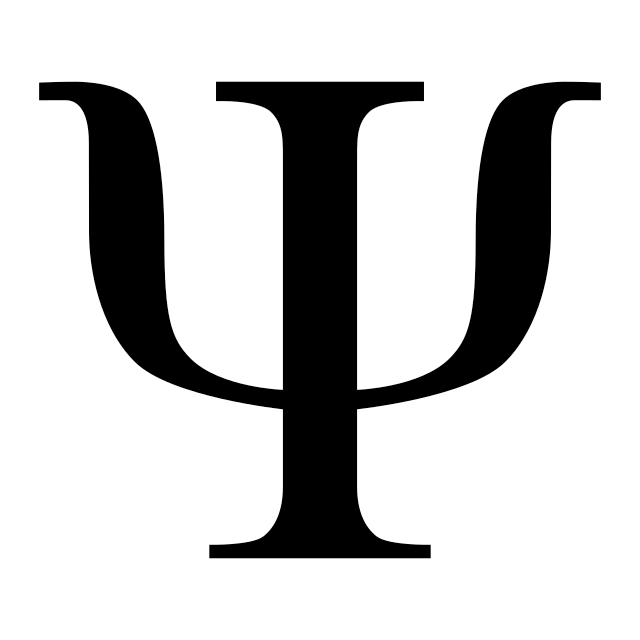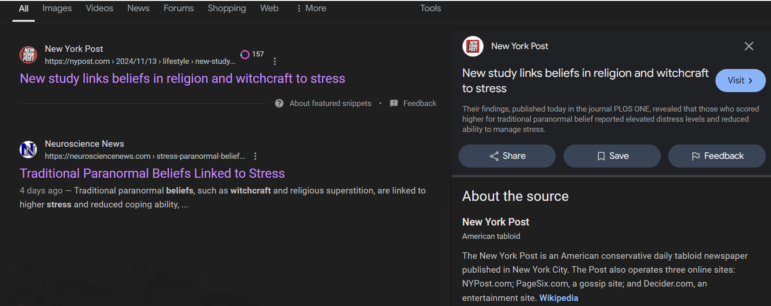LONDON – A research article published last Wednesday gained media traction over the weekend followed by some revised headlines apparently avoiding the word “witchcraft”. The article, Re-evaluation of the Relationship Between Paranormal Belief and Perceived Stress Using Statistical Modelling, was peer-reviewed and published in PLOS ONE.
The research was conducted because previous studies generally found no direct link between paranormal belief and poorer psychological well-being. However, specific aspects of paranormal belief, such as superstition, have been associated with greater vulnerability to stress. The authors write in their introduction:
“Research into paranormal belief is important because supernatural credence persists within contemporary society and potentially influences everyday attitudes and behavior. For instance, investigators report that paranormal belief is associated with lower levels of trust in science and higher anti-science attitudes.”
They also noted plainly:
“While these outcomes indicate that supernatural credence is not detrimental to psychological adjustment and well-being, it remains uncertain whether variations exist because of functional disparities between Traditional Paranormal Beliefs and New Age Philosophy.”
To explore the hypothesis about a connection between paranormal beliefs and stress, the researchers used a measurement instrument well-known in this area of research: the Revised Paranormal Belief Scale (RPBS). The measurement instrument has been around for a few decades with the most recent revision in 2004. It’s a measure of skepticism.
However, prior research has raised concerns about the RPBS’ statistical robustness and its ability to effectively measure the psychological properties that it is intended to assess.
To refine the instrument, the researchers applied a statistical technique called Rasch analysis, which helps improve measurement tools by (1) determining whether a question is challenging and how well it distinguishes between people with different levels of a trait or ability and (2) evaluating how well the test measures what it is supposed to.

The Greek capital letter psi is often used to represent the word, or study of, Psychology.
The researchers collected data from 3,084 participants who completed the Revised Paranormal Belief Scale passed through a Rasch analysis and a separate scale assessing perceived stress. The researcher then used a different technique that connects summarized data and then tests the relationships of clusters, in this case, the RBPS question cluster, to other outcomes, in this case, stress.
The data revealed two broad clusters of beliefs within the RPBS:
- Traditional Paranormal Belief (TPB): This cluster includes beliefs rooted in traditional religious contexts and witchcraft. Examples include the existence of witches but also belief in heaven, hell, and the devil.
- New Age Philosophy (NAP): This cluster encompasses beliefs in precognition, telekinesis, astrology, and trance states.
Key Findings
The study found that only the Traditional Paranormal Belief cluster was associated with elevated distress and reduced feelings of being able to cope with stress.
In contrast, the New Age Philosophy cluster showed no significant relationship with distress or coping abilities. The researchers emphasized the exploratory nature of their findings, writing, “Additional research is still needed if we are to further explore these fascinating relationships in connection to perceived stress, well-being, and coping styles.”
Limitations and Context
The authors also acknowledged a limitation in their study:
“These beliefs reflect a Western, Abrahamic, predominantly Christian perspective. Within the two-factor model, religious supernatural beliefs appear within TPB [Traditional Paranormal Belief] and non-religious supernatural beliefs within NAP [New Age Philosophy]. This categorization overlooks the intuitive, layperson distinction between religious (soul, the devil, God, and heaven and hell) and paranormal (psi, witchcraft, superstition, etc.) beliefs.”
The witches referred to by the RBPS are clearly not the Witches in a modern Witchcraft or NeoPagan context. Also, questions like the existence of witches can be affirmed by individuals who know a member of our community. But it would not mean the same thing and certainly not the RBPS’ Christian context.
So, what are the findings about?
The study connects these findings to the psychological concept of locus of control, which refers to how people perceive control over events in their lives. People with an internal locus of control believe that their own actions, decisions, and efforts directly influence the outcomes in their lives. People with an external locus of control believe that external factors—such as luck, fate, or other people—have a greater influence on the outcomes in their lives. In the latter, people often feel that they have little power to change their circumstances.
The researchers suggest that Traditional Paranormal Beliefs are closely tied to an external locus of control, where supernatural forces are perceived to have significant influence over existence.
“Findings support the notion that TPB [Traditional Paranormal Belief] is attendant with external control, particularly the notion that unknown supernatural forces/powers influence existence,” the researchers wrote.
While inconsistent with how Witchcraft is often understood in our community, it is consistent with Christian ideas about witchcraft and powerful forces from heaven and hell.
But our story doesn’t end there.
Media Headlines and Misrepresentation
The story’s findings have sparked varied reactions in the media. Here are some examples of headlines from the past weekend:
- Feeling Stressed? You May Be More Likely to Believe in Spooky Phenomena – Discover Magazine
- Your Belief in Paranormal, Spooky Activities May Be Spiking Stress Levels; Here’s How – Times Now
While outlets that regularly report on science news were cautious about the presentation of witchcraft, others resorted to witchcraft imagery (you know- pointy hats, potions, staff) and avoided defining traditional religious beliefs.
This,
- New study links beliefs in religion and witchcraft to stress
became this,
- Having These ‘Paranormal’ Beliefs Linked to More Difficulty Coping with Stress – New York Post

Sample from Google Search (Nov 17, 2024)
At the time of writing, all of the updated headlines were up and running. However, for a brief moment, they revealed how easily witches can be pathologized and how the skepticism angle toward a predominantly Christian view of the paranormal was washed away.
Avoidance of that context in a discussion has already led to assumptions and confusion about the study’s findings. To clarify, as both the authors and the RPBS highlight, Traditional Paranormal Belief includes beliefs consistent with predominantly Christian frameworks, such as heaven, hell, and the devil.
The Wild Hunt is not responsible for links to external content.
To join a conversation on this post:
Visit our The Wild Hunt subreddit! Point your favorite browser to https://www.reddit.com/r/The_Wild_Hunt_News/, then click “JOIN”. Make sure to click the bell, too, to be notified of new articles posted to our subreddit.